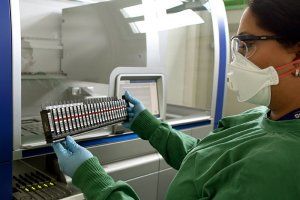
The FDA has just sent letters to five personal genomics companies outlining its intentions for regulation of direct-to-consumer tests, and if 23andMe thought it was having a bad week before, it's sure not going to be happy now. In the letters, the agency says that its test and four others, as currently marketed, will need pre-market clearance because they qualify as medical devices "intended for use in the diagnosis of disease or other conditions or in the cure, mitigation, treatment, or prevention of disease."
Requiring pre-market clearance is a drastic measure, and it's precisely the one personal-genomics companies hoped to avoid by casting their results as "educational" or recreational instead of medical. That's not all; the letters do "not necessarily address other obligations" the companies may have in selling their tests directly to consumers.
Oddly, the FDA hasn't yet sent a letter to Pathway Genomics, the company that started this whole fracas by making a deal (quickly rescinded when it went public) to sell its genomic test in drugstores. The agency tells NEWSWEEK its discussion with Pathway is still ongoing. Here's what it's telling the other five companies:
23andMe. This is the big, Google-backed player in the industry. The company was initially more focused on "fun" DNA results (do you have wet or dry earwax?), but since its launch in 2007 it's been adding medically relevant genes to the list of variants it identifies, including variants in BRCA1 and BRCA2 (breast-cancer genes) and several pharmacogenomic tests that assess patients' responses to medications such as warfarin and clopidogrel. That seems to be what got the FDA's attention: the letter to 23andMe mentions the pharmacogenomic tests and also points out that "the data generated from the 23andMe Odds Calculator, a feature of the 23andMe Personal Genome Service, includes the contribution of single-nucleotide polymorphisms (SNPs) to disease risk. Consumers may make medical decisions in reliance on this information." In other words, laypeople will think of this as a medical device, and we're going to treat it accordingly, which means you'll need to get it officially approved before selling it directly to the public. It's also not a laboratory-developed test, apparently, "because the 23andMe Personal Genome Service™ is not developed by and used in a single laboratory." That matters, because these tests aren't regulated as strictly as other medical devices and kits.
Navigenics. The letter is almost a direct facsimile of what's been sent to 23andMe—the warfarin and clopidogrel tests are notable, and so is a proprietary feature that "provides patients with genetic predispositions for important health conditions and medication sensitivities."
DeCode Genetics. Same basic deal here: consumers may use the test to make medical decisions, ergo, it's a medical device. Here, it's not pharmacogenomic tests that bother the FDA, but tests for 12 genes linked to breast cancer and a statement on the company's Web site that although "the deCODEme Cancer Scan cannot tell you whether you are going to develop cancer, it can alert you to your possible genetic risk and lead to early detection."
Illumina. This is a different kind of company. Although it has a personal-genomics component (it will sequence your entire genome, more or less, for about $20,000), that's not what has the FDA concerned at the moment. Illumina is also the company that provides 23andMe and DeCode with the genetic arrays used to scan 550,000 variants in the DNA. Those, too, may require pre-market clearance as long as they're used in direct-to-consumer genomic tests, says the FDA: "Although Illumina, Inc. has received FDA clearance or approval for several of its devices, we note that the Illumina Infinium HumanHap550 array is not one of them and is labeled 'For Research Use Only.' Yet Illumina is knowingly providing the HumanHap550 array to 23andMe and deCODE Genetics for clinical diagnostic use without FDA clearance or approval."
Knome. This, too, is a different kind of company. Knome doesn't sequence the genome so much as try to make sense of it for consumers who get their data generated elsewhere. Or, as the FDA puts it, Knome offers "a software program that analyzes genetic test results that are generated by an external laboratory in order to generate a patient specific test report." This apparently qualifies as a medical device as well.

There's still a lot more that could happen with regulation of consumer genomics. All five letters offer the companies the chance "to meet with us to discuss whether there are tests you are promoting that do not require review by FDA" and to establish what kind of information the companies need to give the agency. "We're basically telling them they need to come discuss with us whether they're marketing these legally," says FDA spokeswoman Erica Jefferson.
Congressional action may still be in the works, too. Congress sent letters to 23andMe, DeCode, and Pathway in late May, and the companies were due to provide an enormous amount of documents to the government last weekend. So stay tuned: this debate is far from over.
Uncommon Knowledge
Newsweek is committed to challenging conventional wisdom and finding connections in the search for common ground.
Newsweek is committed to challenging conventional wisdom and finding connections in the search for common ground.
About the writer
To read how Newsweek uses AI as a newsroom tool, Click here.





